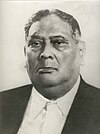Portal:Bangladesh/Selected biography/2

Sher-e-Bangla (Urdu phrase meaning 'The Tiger of Bengal') Abul Kashem Fazlul Huq (Bengali: আবুল কাশেম ফজলুল হক) (26 October 1873—27 April 1962) was a well-known Bengali statesman in the first half of the 20th century. He held different political posts including those of the Mayor of Calcutta (1935), Chief Minister of undivided Bengal (1937-1943) and East Bengal (1954), Home Minister of Pakistan (1955) and Governor of East Pakistan (1956-58).
Huq entered the Bengal Legislative Council in 1913 as an elected member from the Dhaka (Dacca) Division. For 1913-1916 Huq served as the Secretary of the Bengal Provincial Muslim League and Joint Secretary of the All India Muslim League. Then he served as the President of the All India Muslim League from 1916 to 1921. He played an instrumental role in formulating the Lucknow Pact of 1916 between the Congress and the Muslim League. In 1917 Huq became Joint Secretary of the Indian National Congress and in 1918-1919 he served this organisation as its General Secretary.
In 1935, with the Congress' support, Fazlul Huq was chosen and elected first Muslim mayor of Calcutta. Prior to 1937 election, Fazlul Huq reorganized the defunct Proja-Shamiti and renamed it as Krishak Praja Party (KPP). Later that year Sher-e-Bangla joined Muslim League and subsequently become the chairman of the Bengal headquarter of the party. Afterwards he acted as the Chief Minister (also called Premier) of undivided Bengal between 1937 to 1943. Fazlul Huq drafted and moved the Lahore Resolution on 23 March, 1940. According to this resolution, North-eastern and Eastern parts of India happened to be formed as sovereign states.[clarification needed] It established Muslim League's demand for a homeland for Muslims, that ultimately resulted in the nation of Pakistan. However after 1942 Huq actually opposed the Two-Nation Theory and tried to mobilise non-Muslim League Muslim leaders against Partition of India. (more...)
